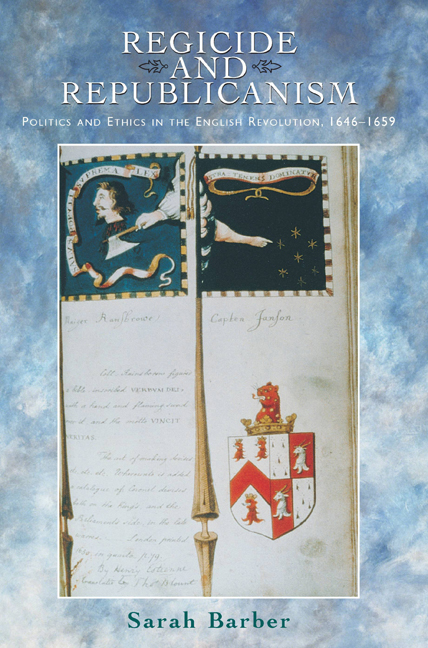Book contents
- Frontmatter
- Contents
- Preface
- List of Abbreviations
- Introduction: Regicide and Republicanism
- 1 Unparliamentary Language and the Dignity of the Crown
- 2 ‘A Mere Man’: Charles Levelled
- 3 The Expense of Blood and Treasure
- 4 King Ahab
- 5 Queen Justice
- 6 Government New Modelled?
- 7 The Engagement of Loyalty
- 8 The Active and the Passive Life
- Epilogue: The Good Old Cause
- Select Bibliography of Printed Sources
- Index
- Frontmatter
- Contents
- Preface
- List of Abbreviations
- Introduction: Regicide and Republicanism
- 1 Unparliamentary Language and the Dignity of the Crown
- 2 ‘A Mere Man’: Charles Levelled
- 3 The Expense of Blood and Treasure
- 4 King Ahab
- 5 Queen Justice
- 6 Government New Modelled?
- 7 The Engagement of Loyalty
- 8 The Active and the Passive Life
- Epilogue: The Good Old Cause
- Select Bibliography of Printed Sources
- Index
Summary
When the gentry of Leicestershire called for Charles to be put on trial and the end of the second civil war, and the petitioners of Berkshire called for an account to be drawn up which made inquisition for the blood spilt and the treasure spent, they petitioned both the parliament and the General Council of the army. They had no doubt that parliament was the correct vehicle for such action, but the composition of the parliament at the end of 1648 was not likely to achieve their aim. Thus, they attempted to lobby the army to put pressure on the Houses and admitted it was necessary to have ‘this present Parliament purg’d, or another and more equall Representative chosen’. Despite the possible implications for parliament's claim to representativeness, there were clearly gentry republicans prepared to countenance using force to exclude legitimately elected members. On 5 December 1648 a majority in the Commons voted that the king's answers were a sufficient basis on which to continue to negotiate a treaty. Time for discussion of the relative merits of purge or dissolution ran out. Three ‘commonwealthsmen’ MPs and three army grandees drew up a list of malignant members of parliament and on the morning of 6 December 1648, they were met at the entrance to the Commons’ chamber by Thomas, Lord Grey of Groby, and a battalion of soldiers from the regiment of Colonel Thomas Pride. Grey identified those who had voted to continue the peace process; Pride's soldiers barred their way. Forty-five men were considered possessed of a degree of malignancy which merited imprisonment. A further 186 members were excluded from attendance at the House. Another eighty-six decided to keep away from London and not embroil themselves in a governmental process which had become dangerous and fraught.
Those few who remained were left to devise a settlement which excluded and condemned the chief delinquent. There were only 154 potentially active MPs. Only a fraction of those were ‘revolutionaries’. But even amongst this small number, those who drew up the documents of the revolution and sat in the High Court arrived at this dramatic point carrying with them differing concerns.
- Type
- Chapter
- Information
- Regicide and RepublicanismPolitics and Ethics in the English Revolution, 1646–1659, pp. 121 - 146Publisher: Edinburgh University PressPrint publication year: 2020

